Steve Jackman has been filming events and interviews for Material Beliefs, and editing short films along the way – some are online already here. In addition, Steve has taken part in “Science on Film“, a joint initiative from the Documentary Filmmakers Group and the Wellcome Trust.
Science on Film is a unique opportunity for filmmakers and biomedical scientists to collaborate on an intensive film production and training scheme taught by leading broadcast professionals and scientists
ilms will premiere at a special gala event in London with leading TV and science figures in attendance. They will also be entered for the Wellcome Broadcast Development Awards and showcased on Channel 4’s FourDocs.
Steve worked with Bala Sirigireddy on their short film Blood Sample, here’s an online version (flash required) of their film, and here’s a list of all the films from the initiative.
There are a series of events to launch films, so you can hear form the participants, as well as watch the outcomes on the big screen:
Thurs 24 Jul – 12 noon – at the Crown & Two Chairmen
Fri 25 Jul – 11am – at the Curzon Soho Mini Cine
Tues 29 Jul – 5pm – at the Curzon Soho Mini Cine
Also, Steve mentions:
‘Science on Film… Where Next?’, looking in broader terms at the future of science on film. David Dugan (dir/producer, made lots of episodes of ‘Horizon’, etc) will be speaking, along with two Science on Film participants and Rachel Hillman (Wellcome Trust). Mon 28th Jul, 1pm at Foyles Bookstore, lasts about 90 mins.
The Future of Docs event, taking place (same day I think) at 5pm at the Apple Store. someone from DFG will be speaking, as may someone from Wellcome. Guessing that some SOF films might be shown…
Stand by also for more short documentaries from Steve for Material Beliefs!
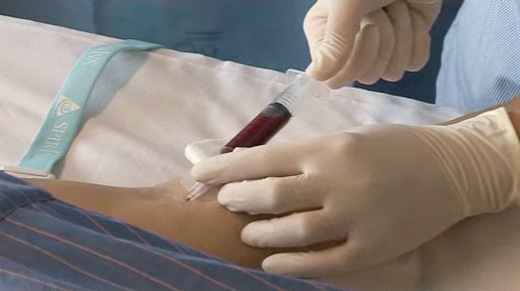
Posted by wordpress · event, news · leave comment »
The Secret Garden Party starts today (July 24th) and runs for 3 days. The theme of the festival this year is revolutions, and the marketing leads with a quote from Bertland Russell:
Thought is subversive and revolutionary…Thought is great and swift and free, the light of the world, and the chief Glory of man
As well as a packed roster of bands and acts, The Secret Garden Party follows on this years cerebral theme with a range of “Action Camps” including a Guerrilla Science Camp. Here’s a pdf with the line-up of hands on science taking place in this corner of the festival grounds over the 3 days.
Susana and Tobie will be there representing Material Beliefs, come along from 4-5pm on Friday 25th and invent your own biological-silicon hybrid in a range of colourful plasticines!
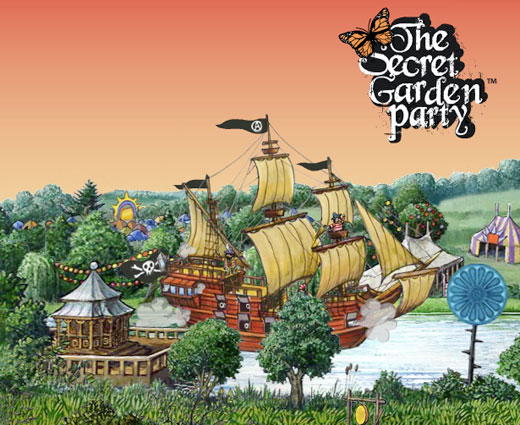
Posted by wordpress · event · leave comment »
I thought I’d use my first entry to introduce myself. My name is Alex Zivanovic and I’m a freelance robotics/mechatronics/electronics/computing consultant and I’m collaborating with the Material Belief’s team.
My background is in engineering, specifically robotics, having done a PhD and postdoc research at Imperial College London on medical robotics. Over the last few years I have become interested in the artistic side of robotics, particularly, robots as interactive sculpture. I have carried out research into the work of the artist Edward Ihnatowicz, particularly the Senster and have made a website about it.
I teach workshops on using the Arduino (a microcontroller aimed at artists and designers), for Tinker.it. In particular, I run one on using actuators.
I teach one day a week at the Royal College of Art on the Design Products course, helping the students incorporate electronics into their products.
I also carry out commissions for artists wishing to use mechatronics in their work.
You can find more information about me on my website.
Posted by Alex Zivanovic · background · Comments Off on Alex’s first post: about myself
Dr. Julian Vincent is the director of Biomimetic and Natural Technologies and professor of Biomimetics at the Department of Mechanical Engineering – University of Bath. He is also an associate chief editor since 2003 for the Journal of Bionic Engineering.
See more of Julian Vincent in conversation with Susana Soares, filmed by Steve Jackman.
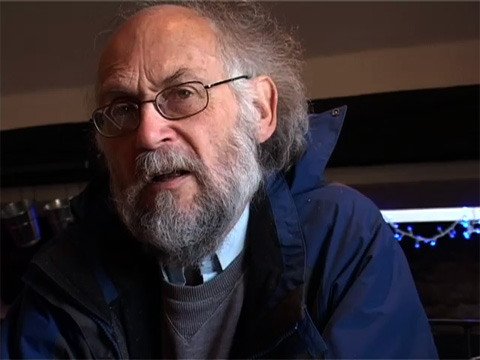
Posted by wordpress · event · leave comment »
Having originally started in the field of artificial intelligence, De Grey worked until 2006 in the Department of Genetics at the University of Cambridge. After we created the SENS platform, an engineering project for curing human ageing and is the Chairman and Chief Science Officer of the Methuselah Foundation, a non-profit charity dedicated to combating the ageing process.
See more of Aubrey de Grey in conversation with Susana Soares, filmed by Steve Jackman.
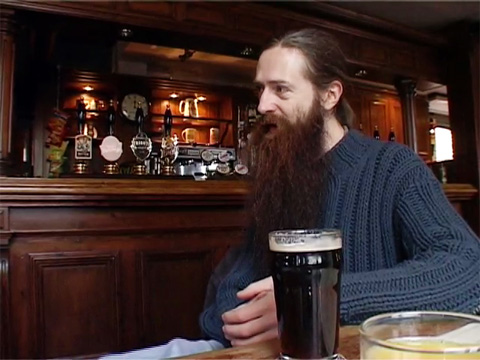
Posted by wordpress · event · 1 comment »
The neurally controlled animat consists of a culture of cortical cells which interact with the real world. The cells are in a lab, and become embodied by controlling a robot which acts as the artificial body of the remote ‘brain’. The robot is able to sense it’s surroundings, and pass this information back to the culture of cells. This creates a feedback loop between the cells and the robot.
This page provides more detail about the project…
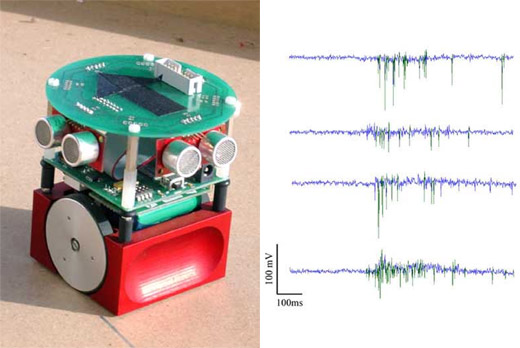
Posted by wordpress · background · leave comment »
“Talking with experts” was a two weeks assignment that the 4th year students at the Industrial and Interaction Design programme at Syracuse University did as part of the Environmental Design class.
The project was based on Material Beliefs, in collaboration, approach and students where taught to challenge their working methods by encouraging to talk with experts and bring them as collaborators of their work.
As described at Design and the Elastic Mind catalogue preface by “Nowadays the role of design is changing… we are looking at one of the design’s most fundamental roles: the translation of scientific and technological research into approachable objects that change people’s lives and as a consequence, their environment”
The aim of the this brief project was to enable space for students to create a collaboration between design and other disciplines, starting to depend more on experts opinions by interpreting and translating that feedback in their design projects.
The areas of interest gravitated around genetics, bioengineering, gerontology, the increase of life expectancy and ageing, regenerative technologies, tissue engineering and prosthesis and implants.
Interesting outcomes took place such as the work of the students, Jeanne Harran and Adam Karl, just to mention some examples.
Also students used their learnings to apply, afterwards, in other projects.
Initially teaming up with Ashley Waring, Jeanne and Ashley interviewed Prof. Robert Smith working at the Dep. of Biomedical & Chemical Engineering at Syracuse University. Currently he is working on cochlear implants and how can they improve the quality of life of individuals with auditory needs, at the Institute for Sensory Research. They also spoke with Joanne a research participant that received a cochlear implant after losing hearing in both ears at the age of 19th. Her implant had a great success.
However for children who were born deaf these implants have a better chance of being succeed if made at the age of 2.
Jeanne decided to take the project further and focused on the ethical issues behind cochlear implants. Since parents play a key role in the child development along with the moral responsibility to opt by an implant. However members of the deaf community believe that implanting an infant is morally wrong.
Her project is to create an interface that could help both parents and child to become part of the deaf community as well as help to carry some of the problems that they have to face with the implant.
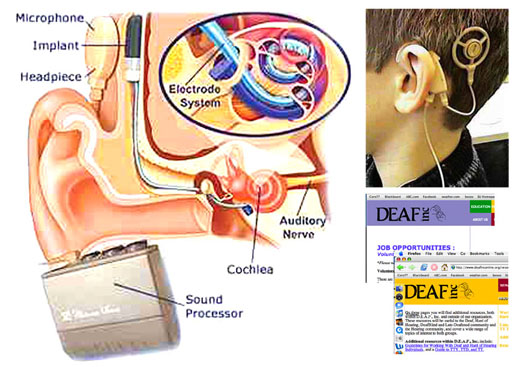
By other hand Adam took a more problem solving approach. RJ Wattles, Evan Williams and Adam interviewed Prof. Julie Hasenwinkel working at Syracuse University L.C. Smith College of Engineering and Computer Science. Julie is researching absorbable biopolymeric gels for post-surgical tissue adhesions and new solutions for bone cements for fixation of joint replacements. During the interview they found out how cement guns were difficult to use and cumbersome. Certain cement mixing systems were also inefficient and complex.
As Adam decided to continue to collaborate with Julie team, he decided to design the implant cement injection gun.
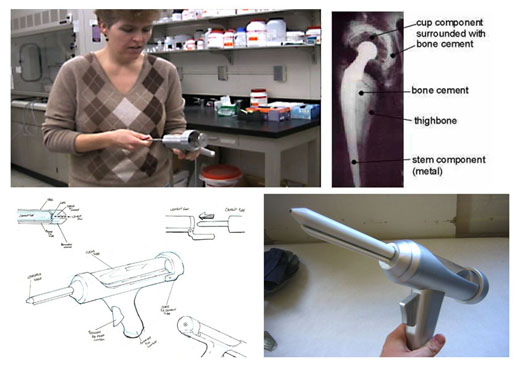
Posted by Susana · event · leave comment »
Students and staff at the Design Interactions course at the Royal College of Art took part in a two day workshop at the Institute of Biomedical Engineering. The aim of the workshop was to provide those from the RCA with an embedded view upon biomedical technologies, and for those based at IBE to have a refreshed set of responses to their research.
The workshop included an introduction and tour from Rob Fenton – Research Development Director at IBE – with presentations from Nick Oliver and Olive Murphy, and lab experiments lead by Shahid Aziz and Thao Le.
This kicked off a four week project for Design Interactions students, with researchers at IBE and Reading taking up visiting tutor roles at the RCA through tutorial sessions, providing feedback on the projects. A project blog was set up by Cesar, to share design materials and other start points.
Additionally, Paul Thurston of Think Public, Tom Shakespeare of PEALS and Alex Wilkie from Goldsmiths were invited to provide a programme of evening lectures for students to hear about how public sector work and sociology might broaden the exchange between biomedical engineering and reflective design.
A final crit takes place on Thursday 15th May, with a morning of discussion following on friday 16th. Please get in touch if you would like to know more about this workshop, or would like to try something similar.
During a frenetic tutorial with Bernard, his digital plaster sent a message. In fact it was Gunnar, who was sat behind us.
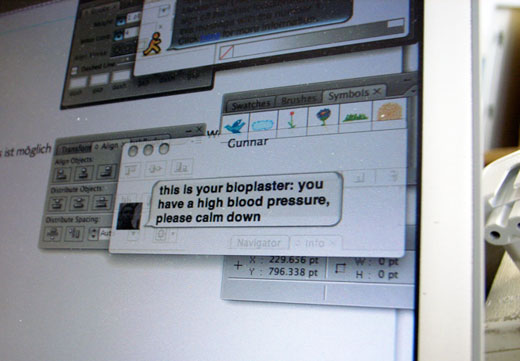
Posted by wordpress · event · Comments Off on Design Interactions workshop at IBE
Yesterdays Observer carried an article by Lucy McDonald about the Material Beliefs event at the Dana Centre.
Cafe Scientifique events provide an environment where science can be discussed informally over drinks. There’s comment here from Duncan Dallas, who talks about the success of the format, which was set up in Leeds in 1998:
For me the whole point of science cafes isn’t to promote science or make more kids become scientists, but it is about being able to discuss topics which are revolutionary.
The article contrasts the popularity of the science cafes with the drop in uptake of physics at A-level, “from 43,416 in 1991 to 28,119 in 2005″. There’s cause for concern here, but where initiatives like the Science Learning Centres respond to issues in uptake of science in schools, and the provision of science learning for young people, science cafes are for those who left school some time ago, and address their continuing relationship with science through the broader role it plays in their society. Quotes in the article from the evening attendees reflect this:
It’s all really relaxed and you don’t feel intimidated about challenging speakers beliefs or scientific research. Science is becoming more part of out lives, and I want to hear about it from the experts.
It’s an increasingly scientific society that we live in, understanding what’s going on in science helps put everything in context.
There’s no dull theorising so it was rally accessible, it’s better than staying in and watching television every night.
Posted by wordpress · background, news · leave comment »
My Space, My City, My World was a three day conference for year 10 students in south east London, based at the Steven Lawrence Centre in Deptford. Material Beliefs was invited by Ignite! to run two of the workshops, other project partners included Aspire, London Engineering Projectand the Stephen Lawrence Charitable Trust. Here’s something about the event from the Ignite page:
The conference aims to build young people’s confidence in making their voices heard in the places where decisions are made about design, engineering, economics and the future.
My Space, My City, My World will explore individual students’ personal ‘footprint’, their views about the urban landscape, and the way the world is going. Workshops will be led by young, keen and green entrepreneurs, designers, scientists and engineers – and debates will explore how one person can make a difference.
On tuesday, Tony Cass and I lead a workshop an DNA profiling, which responded to technology from the Institute of Biomedical Engineering and DNA Electronics. Elio Caccavale and Mark Hammond lead a workshop on thursday based around the Animat project at the University of Reading. The aim was to encourage the students to design their own products and services around these emerging technologies.
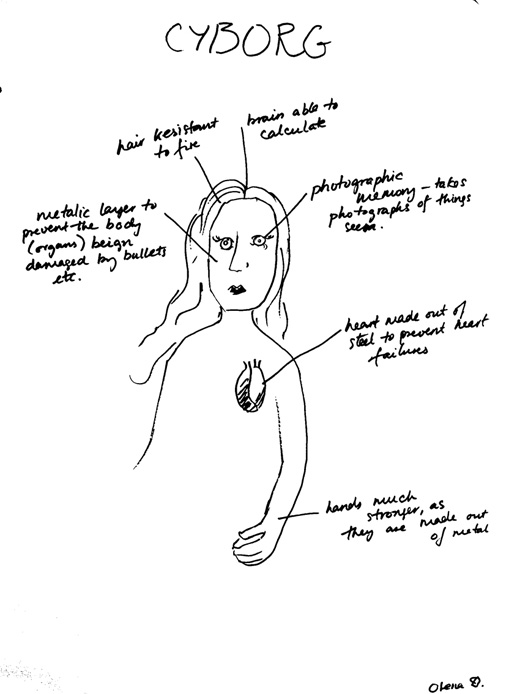
above: a design for a cyborg
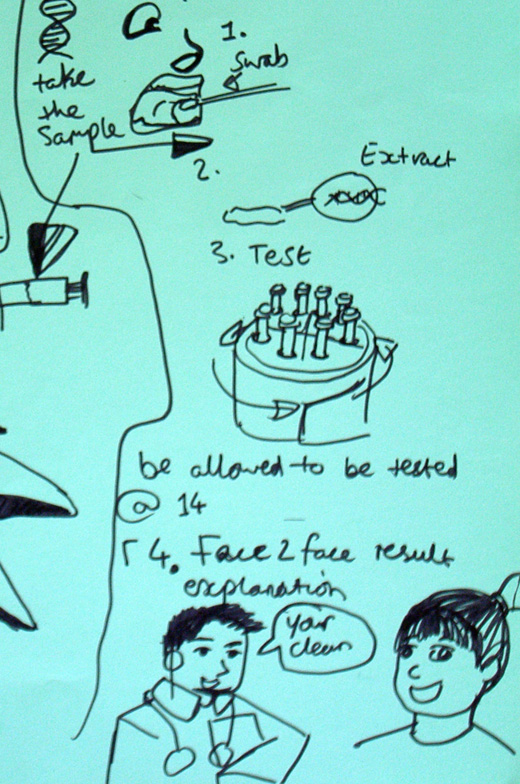
above: service design for DNA profiling
Posted by wordpress · event · leave comment »









